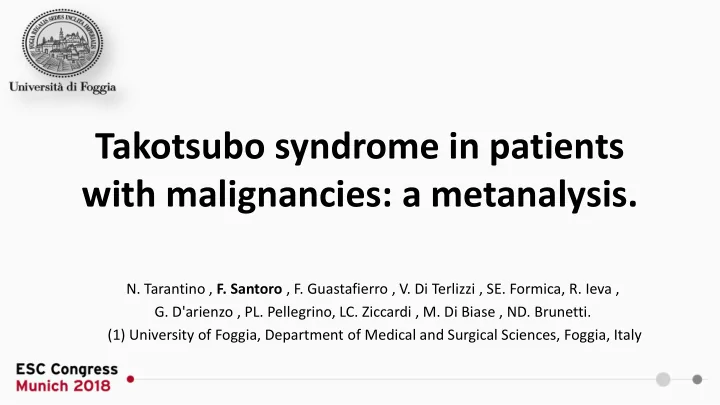

Takotsubo syndrome in patients with malignancies: a metanalysis. N. Tarantino , F. Santoro , F. Guastafierro , V. Di Terlizzi , SE. Formica, R. Ieva , G. D'arienzo , PL. Pellegrino, LC. Ziccardi , M. Di Biase , ND. Brunetti. (1) University of Foggia, Department of Medical and Surgical Sciences, Foggia, Italy
Takotsubo syndrome (TTS) is an acute heart failure, featured by reversible LV dysfunction that: 1) mimic acute myocardial infarction; 2) affects mainly woman at their post menopausal age; 3) can be caused by a large variety of emotional and/or physical triggers. Several cases are related to malignancy, as shown in retrospective studies and single reports. Some studies found that TTS could be a paraneoplastic phenomena Chemotherapeutic drugs may also provoke TTS, the agent cited most often reported is 5- fluorouracil (5-FU), but there are additional data implicating rituximab, vascular endothelial growth factor antagonists, and vascular disrupting agents.
among 24,701 patients of the United States nationwide inpatient sample the prevalence of malignancies in TTS was 14.4%, which also significantly exceeded the prevalence of an age-matched group of myocardial infarction patients (10.0%) and orthopedics (8.8%). Purpose: To evaluate the overall prevalence of cancer in takotsubo patients and to compare clinical outcomes with cancer-free takotsubo subjects in a metanalysis study. Am J Cardiol 2012;110:1368 – 1372
Methods: In December 2017 a Pubmed and ResearchGate systematic screening was conducted for retrospective studies concerning this topic. Works with no comparison group were excluded. Outcomes of interest were in-hospital events (life threatening arrhythmias, cardiogenic shock, thromboembolism) and events at follow-up (all-cause mortality, re- hospitalization for cardiovascular disease) assessed with Mantel- Haenszel pooled risk ratios (RRs) and 95% confidence intervals (CIs). Furthermore, an analysis of the most frequent occurred neoplasms as well as the time to the diagnosis after the index event was performed. Results: Three studies were included with a total of 554 patients. The prevalence of history of current or previous malignancy among patients admitted with TTS was 20% (113 subjects). Gastrointestinal cancer was the most frequent associated neoplasms (23%), while nervous system and urinary cancer were the rarest (3% for each).
When compared to non-cancer patients, patients with current or previous disease showed a statistically significant relative risk of clinical events (both in-hospital and at follow-up) (RR 1.82, 95%, 1.37-2.42, p <0.001).
The risk of in-hospital events was higher in cancer group, although not significant (RR 1.30, 95% CI, 0.74-2.29, p= 0.36), whereas events at follow-up were statistically more probable (RR 2.08, 95% CI, 1.50-2.87, p <0.001). in-hospital incidence of cardiogenic shock, life threatening arrhythmias, length of in-hospital stay in patients with takotsubo syndrome and cancer vs controls (p n.s. in all cases).
Conclusion: History of cancer carries an increased risk of adverse events in TTS patients; a careful follow-up may be recommended in TTS with history of cancer.
Key messages •Physicians should be aware that patients with TTS and malignancy may require a longer stay in intensive care unit. Additionally, a strict routine cardiological follow-up may be needed. •Patients with malignancy, after TTS episode should be followed by a cardiologist and may probably benefit from standard therapy for heart failure, especially an angiotensin-converting enzyme (ACE) inhibitor or angiotensin receptor blocker.
Recommend
More recommend